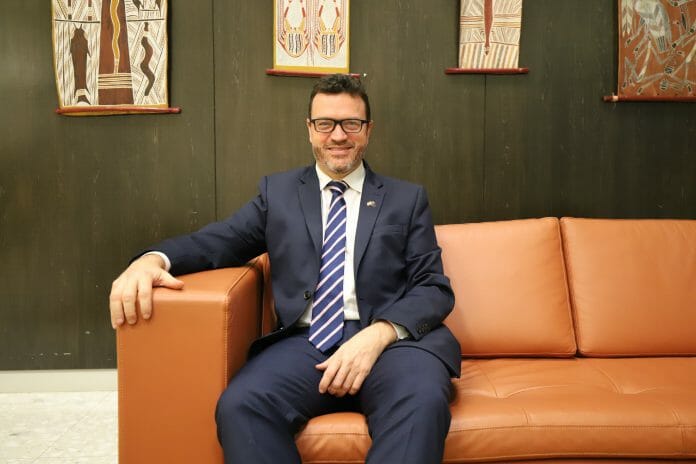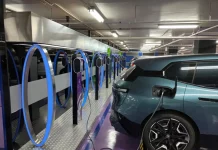BY SHARON CHANG
With the bilateral relationship being in such good shape, and Malaysia hosting APEC and conducting “Visit Malaysia 2020”, Australia’s Minister for Foreign Affairs and Minister for Women, Senator the Hon. Marise Payne, recently announced she has chosen Malaysia to be the focus country for the Australian Government’s annual major public diplomacy programme, ‘Australia now’.
Hence, Australia will be working with partners and sponsors in coming months to develop some exciting events and activities for their ‘Australia now’ programme, and looking forward to connecting with many old and new Malaysian friends alike throughout the year, in such areas as culture and arts, STEM, business and commercial ties, food, media, gender issues, and beyond.
Business Today talks to Michael Growder, Deputy High Commissioner of Australia.
Q. What is the state of Australia’s and Malaysia’s bilateral relations?
A. The relationship between Australia and Malaysia has never been better. Educational
relationships, migration, tourism, business and trade are areas which have been underpinning the relationship for a long time.
Q. We had a change of government in 2018, are there more opportunities as compared to the previous administration?
A. Ever since May 2018, with the new government coalition – Pakatan Harapan – the relationship has provided more interesting opportunities to work together as we realised that Australia and Malaysia have many similarities.
Q. What kind of model can the Pakatan Harapan government leverage on?
A. When a reforming government like Pakatan Harapan comes into power with a big agenda, we come forward and ask how we can be useful. We want to contribute so that Malaysia can leverage on our model of electoral and judicial reform, economic policy, education to name a few.
In May 2019, Australia increased its contribution to the United Nations Development Programme’s (UNDP) electoral reform assistance project in Malaysia from RM1.8mil to RM3mil. The UNDP is working with the Malaysian Election Commission on electoral system reforms in the country.
And, also, in September 2018, the Australian Parliament welcomed a delegation from the Dewan Rakyat – lower house of the Malaysian Parliament. It was the first parliamentary delegation to visit Australia since the new government was elected in May 2018.
This programme focuses on learning about Australia’s parliamentary processes, procedures and institutions. The delegates attended presentations given by officials of the Parliament and also met with officials from the Australian Electoral Commission, the Independent Parliamentary Expenses Authority and the Department of Finance.
The delegation consisted of senior members of parliament as well as parliamentary officials and was led by the Speaker of the Dewan Rakyat, Dato’ Mohamad Ariff bin Md Yusof MP.
Though the connection between the two nations are already strong and well established, the visit substantiates the positive and productive relationship between Malaysia and Australia for the benefit of both countries and the wider region.
Q. You mentioned that the bilateral relationship is good, but how is it in terms of diplomatic representation?
A. Each change of government, there will be a change of agenda but the foreign policy which reflects national interest does not change. There is still a real interest in partners like Malaysia.
The oldest Australian government partner agency here [at the High Commission] is the Australian Federal Police (AFP), since 1973 – one of the AFP’s oldest overseas posts – this shows that the police relationship is good. And, the youngest agency is the Financial Intelligence Unit (FIU) which is also called AUSTRAC – our first posted officer in a diplomatic mission in the world.
AUSTRAC is part of the Home Affairs portfolio, reporting to the Hon. Peter Dutton MP, minister for Home Affairs, which works together with Bank Negara Malaysia (BNM) and other FIUs around the world.
We have got agriculture and education counsellors here too. These are not principally internationally focused agencies in Australia, with only about a dozen people posted around the world. But Malaysia is one of the countries we have picked, which just says how important our relationship is with Malaysia. It’s the breadth of the relationship.
Q. Australia is part of the Five Power Defence Arrangement. How is it relevant today and has the cooperation diminish?
A. The Five Power Defence Arrangement (FPDA) is a non-binding defence pact between UK, Australia, New Zealand, Malaysia and Singapore, setup in 1971, to consult each other if the defence of Singapore or Malaysia is threatened.
Though the regional geopolitics and defence forces of each member has shifted compared to 1971, it still helps to deliver the national interest of all the countries involved. It’s in Malaysia’s interest to have good friends working together, and vice versa.
Australia gets a lot out of the FPDA in terms of bilateral and, also multilateral benefits.We have kept it relevant and contemporary by ensuring the threats and risks we faced in the region are addressed.
In the last 15 to 20 years, we have had catastrophic damages attributed to typhoons and tsunamis, thus, we need to train together to be efficient and effective as possible, for example the Humanitarian Assistance and Disaster Relief (HADR). It is the same when it comes to terrorism and maritime security.
Each member has differing defence priorities and outlook. In 1992, Australia and Malaysia agreed on a bilateral defence cooperation programme, named Malaysia Australia Joint Defence Programme (MAJDP), underpinned by the relationship built in FPDA. There are a dozen Malaysians posted in Australia and Australians posted here for training roles such as in infantry, air warfare. We have so much to learn from one another and it shows a measure of deep trust.
Recently, Australia sent a submarine visit to Sabah – a first submarine visit – which shows the relationship and defence trust is extraordinary.
Q. Can you share how Malaysia and Australia trade balance. What is the primary reason for Malaysia’s trade deficit? And how can it be narrowed?
A. The trade balance between two countries is largely reflective of the relative strength of each economy’s particular products. Currently, Malaysia imports coal, wheat, milk,
beef and education services from Australia, whereas Australia imports tourism services, palm oil, tin, rubber and, oil and gas from Malaysia.
When a country wants to build solid trade or investment flows, the proposal needs to be commercially attractive and competitive, that is how to increase exports. Matrade and Austrade can always cooperate to promote smaller businesses which do not have the resources.
Q. Currently, there are four campuses in Malaysia, are there any plans to increase the number of campuses or partnerships in future?
A. There are three branch campuses (Monash, Swinburne and Curtin) and one joint venture with KDU (University of Wollongong) in Malaysia Education is a social and business issue. There is no government involvement and regulatory oversight on the recently opened University of Wollongong. It’s entirely the university’s decision.
Prime Minister Tun Dr Mahathir commented that Australia has brought education to Malaysia for Malaysian students who cannot afford to go offshore can now do their quality courses here University students around the world want quality education, and with our experience in international education, the twinning programmes are a good way for Malaysia to expand that, it’s a great combination.
Q. This year is Visit Malaysia 2020, how can we attract more Australian tourists into Malaysia?
A. Tourism is a big industry. Malaysia is a beautiful country with so much potential. The Malaysian tourism authority needs to promote its local destinations. Places like Sabah and Sarawak have so much beauty, which will attract people and set Malaysia apart from places like Thailand, Singapore or Indonesia.









